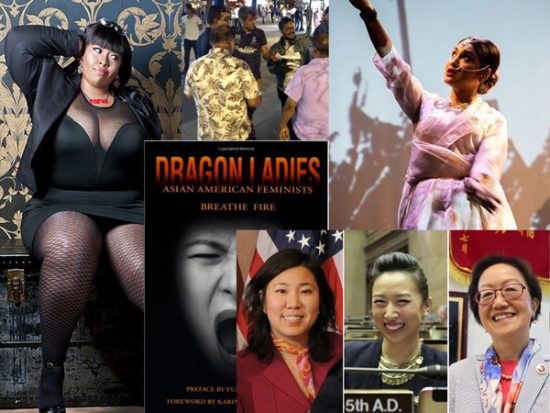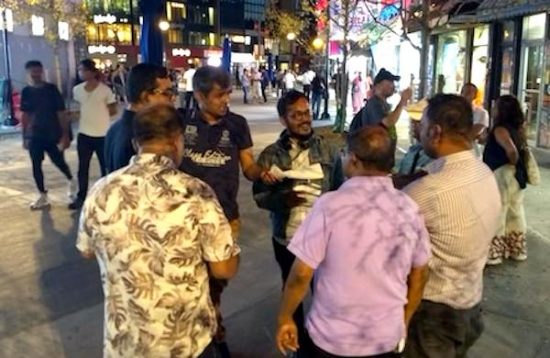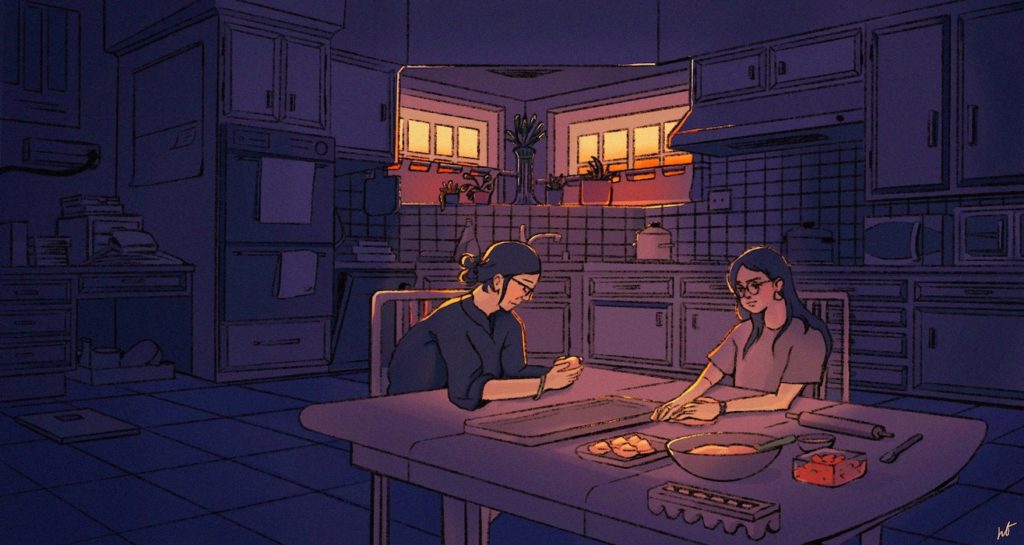Long before domestic workers organizer Ai-jen Poo won a “genius grant,” we spoke to her about her radical ideas on remaking women’s work

September 26, 2014
Long time domestic worker rights activist Ai-jen Poo, Director of the National Domestic Workers Alliance (NDWA) and co-director of Caring Across Generations, was among the winners of the 2014 MacArthur Foundation Fellowship, popularly known as the “genius grant,” announced last week.
The prestigious award recognizes and celebrates creative individuals “with a track record of achievement and the potential for significant contributions in the future.” With her $625,000 grant, Poo plans to train NDWA caregivers as public policy fellows in the field which deeply impacts their lives.
Open City spoke to Ai-jen Poo in 2012, when she was featured by Time magazine as one of the world’s 100 most influential people, and Gloria Steinem praised her work for going “beyond organizing to transforming.” At the time, NDWA was fighting to implement a Domestic Workers’ Bill of Rights in California to extend overtime protection to housekeepers and nannies—a law that finally went into effect January 1, 2014.
Since then, Poo’s initiatives have won labor protections in Hawaii, Connecticut, Illinois, and California, and increased awareness of the plight of close to two million domestic workers excluded from most federal and state labor laws.
Below are edited excerpts from our conversation.
On what kindled her activism:
I don’t think there was really one moment. There were so many moments early on when you get a taste of what it would feel like to win for this group of women who risk everything to come to meetings, and try to improve their lives and make change. And then you see the change happening in big and small ways and it just keeps pulling you in.
My mother and grandmother were really strong role models for me. They always challenged me to realize this notion that anything is possible. My father was an activist. I grew up with the sense that it is our responsibility to do something about the injustice that we see. Between these two influences, I was always drawn towards activism and to women’s organizing and leadership.
I volunteered at a domestic violence center—the New York Asian Women’s Center. And, there, as a hotline volunteer I heard so many stories that drove me towards wanting to address the root causes of violence and inequality in women’s lives. And I thought if we could unlock that, then so many other things could be addressed.
On how transforming women’s work transforms society:
I think that there are two core pieces when you look at the economy through the eyes of women. One is really in valuing the work—accounting for the work that goes into caring for families, work that has historically been assumed as women’s work, unpaid or low paid. And that means everything from ensuring that domestic workers have labor rights to actually having good work-family balance policies like paid sick days and paid family leave—having workplace flexibility to allow people to take care of their families and do what they have to do.
The other piece of it is that as the whole economy moves towards service, which is often gendered female work, more and more women are entering the workforce. Much of the economic engine of this country is women. And so, a tremendous investment in improving the quality of low-wage work—making sure that every job is a living wage, a dignified job with benefits and really investing in low-wage service industries, and making sure the quality of those jobs is good—will have a transformative effect, not only on women, but everyone.
On the economic and social opportunities of “caring” work:
The root issue is that domestic work does not have the recognition and protection it deserves. We need to value it.
Domestic workers now are fighting for the creation of 2 million jobs in home care, to take care of the growing aging population in this country. You can actually see how creating quality jobs for a group of women can address a whole set of social needs, like elder care, which is increasingly going to be a need for this country. There are solutions. And they’re almost win-win when you invest in women.
Much of the economic engine of this country is women. Improving the quality of low-wage work will have a transformative effect, not only on women, but everyone.
On how to change cultural attitudes towards caregiving:
We (NDWA) talk about valuing the dignity of all work, whether it’s paid or unpaid. And whenever we think about social change, we think about three different arenas that are all connected. One big piece is around hearts and minds, and how do we change the way people think and feel about this work—given how intimate and personal this is for everyone, allowing the space for people to connect to the deeper emotional value of this work in their lives is important.
Secondly, changing behaviors by challenging employers to do better by the workers they count on everyday. And challenging people in intimate relationships to share and recognize the work that goes into caring for families. Challenging people to show appreciation for that caregiving work.
The third arena is around policy change—challenging systems and institutions to really support and codify the hearts-and-minds change, and the behavioral changes that we’re advocating for.
On using art and cultural expressions in organizing:
Arts and culture is huge! In New York when we were fighting for the bill of rights, arts and culture played a huge role in that campaign. Some of the Caribbean members of Domestic Workers United wrote a calypso about the bill of rights and we sang it when we went to Albany. The Latina members wrote a kumbaya about domestic workers. We also had this dance that we did, called the “Domestic Slide,” inspired by the Electric Slide. So, you’d see hundreds of yellow t-shirts doing the Domestic Slide in front the of the Capitol building.
You have to utilize art and culture to keep the momentum and spirit alive, especially when you have the long campaigns that are about historic policy change. It’s a way of reaching people that cuts through so many of the political debates.
Millions of people went to see the film The Help. Most of those people don’t think about how domestic work figures into their lives. But we were able to utilize the popularity of the film to challenge people to make that connection, and to also get involved and see how they can make a difference.
I think there are huge opportunities with arts and culture to reach a broader audience for our issues. A big part of our work is to document and elevate the stories of our members. In partnership with Participant Media, the producers of the The Help, we were able to do just that. There’s an art to having stories break through to a larger audience. There are a million compelling stories—just documenting and collecting them isn’t enough. We need to tell the story in a way that resonates broadly in an art form.
On how the treatment of domestic workers is connected to the U.S. legacy of slavery:
For a country that places such a value on democracy and equality, to have for so many years excluded farm and domestic workers from labors laws, and to have not addressed this—I think that we are uniquely bad!
There are a million compelling stories—just documenting and collecting them isn’t enough. We need to tell the story in a way that resonates broadly in an art form.
On NDWA’s approach to organizing:
Even though we [the NDWA] are fairly young, in just 15 years we’ve been able to accomplish quite a bit. I think we are innovating in a way that is going to be helpful to the world.
There’s a lot of fear across the board because there’s an incredible amount of economic pressure on women. Many women are supporting families both here and abroad and their jobs are highly precarious. There’s no job security. There’s also this myth that if you keep a low profile you’re safe. And a lot of our work is saying that being part of an organization is in some ways your best protection. You’re always vulnerable anyway, but if you’re connected, that’s a source of support, strength and resources if anything were to happen.
Courage is cultivated collectively. When you’re sitting in a circle of women, and you hear their stories, you realize that you’re not alone—that we’re in this together. We spend a lot of time opening the space for people to share their stories—realizing that not only are we not alone, but how powerful we are collectively.
On revaluing resources:
Twenty years ago, Gloria Steinem wrote the essay, “Revaluing Economics.” I highly recommend it. She talks about two invisible resources upon which everything else in society and the economy are built– the work that women do at home caring for families and the planet’s natural resources. Over time, these two resources have been made invisible, exploited, devalued. And this is not sustainable; it’s creating a crisis.
Any vision for the future has to fundamentally revalue these two resources, hold them at the center, and protect them. Our organization’s vision is to move an economic agenda forward, create equity and a real sense of investment in all the invisible forms of low-wage service work that are the real economic drivers in this moment. We want these jobs to be full of dignity and be able to support families. We’re trying to build a caring economy and we have a concrete idea of what that looks like: women’s roles are key in that vision. And caring across generations is a pathway to getting there.
So 10 years from now, let’s say there’d be a domestic workers bill of rights in every state. But there would also be a much more fundamentally caring economy, one that really values the resources that have been historically invisible and that creates equity where’s there’s historically been injustice.



